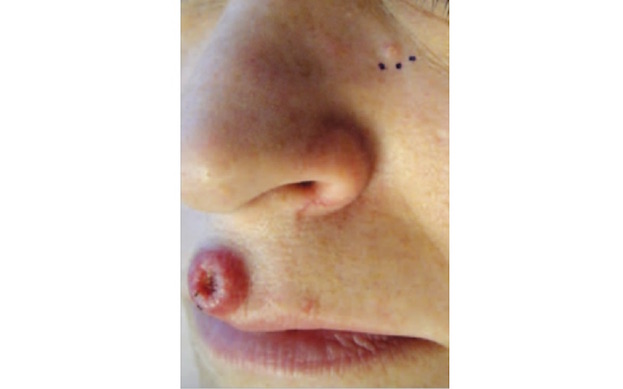Woman's Skin Lesions Reveal Rare Genetic Disorder

A woman who went to the doctor with four small lesions on her face turned out to have a rare genetic condition that put her at high risk for a number of cancers, according to a new case report.
The condition, known as Muir-Torre syndrome, occurs when a person has mutations in several of the genes that are responsible for repairing damaged DNA. These mutations increase a person's risk of skin cancer as well as a number of internal cancers, including colon, breast, endometrial and pancreatic cancers, according to the report.
Only about 200 cases of Muir-Torre syndrome have ever been reported, said Audrey Dean, a medical student at Marshall University in West Virginia and the lead author on the case report, published Wednesday (Oct. 14) in the journal JAMA Dermatology. [Skin Cancer: Prevention, Treatment and Signs of Melanoma]
But this case is important because the woman's skin lesions are a textbook example of the skin problems that signal this very rare genetic condition, Dean said. Indeed, dermatologists are often the doctors who diagnose the condition, she told Live Science.
The 41-year-old woman first came to the outpatient dermatology clinic in May 2013, with a painful nodule on her upper lip that measured about half an inch (1 cm) across. She also had three other lesions on her face and neck. She told the doctors that the lesions had developed in the past six months, the authors wrote in the report.
Doctors performed biopsies on each of the lesions, and found that two were a type of skin cancer called squamous cell carcinomas, while the other two were benign tumors called sebaceous adenomas.
It was this combination of lesions that suggested that the woman had Muir-Torre syndrome, Dean said.
Sign up for the Live Science daily newsletter now
Get the world’s most fascinating discoveries delivered straight to your inbox.
Further testing revealed that the lesions had abnormal levels of certain types of proteins that are involved in DNA repair, she said.
Based on these findings, the doctors referred her to a geneticist, who confirmed she had Muir-Torre syndrome, Dean said.
The woman had "a classic presentation of [Muir-Torre syndrome]," but doctors don't often see such combinations of lesions in clinical practice, Dean said. Because early diagnosis can potentially decrease the risk that a person will develop future cancers, it's important to consider this condition in people who have multiple lesions on their face, she added.
Muir-Torre syndrome is hereditary. Indeed, the woman told the doctors that her paternal grandfather died from melanoma, and her father died from colon cancer, according to the report. In addition, she said "most of the men in her family had died from some form of cancer" when they were in their 40s, according to the report.
The condition is a subtype of Lynch syndrome, another genetic disorder that also increases people's cancer risk, especially colon cancer risk. It's estimated that Lynch syndrome causes about three out of every 100 colon cancers, according to the Mayo Clinic.
To reduce her risk of developing an advanced cancer, the woman will undergo frequent cancer screening tests, including colonoscopies and mammograms, according to the case report.
After her diagnosis, the woman had the two skin cancers surgically removed, the authors wrote in the case report.
When doctors last saw the patient, in October 2014, they noted that she was doing well. Dean reported that the woman was up to date on her cancer screenings, and was planning to undergo a prophylactic operation to remove her ovaries, fallopian tubes and uterus at the advice of her geneticist.
Follow Sara G. Miller on Twitter @SaraGMiller. Follow Live Science @livescience, Facebook & Google+. Originally published on Live Science.











